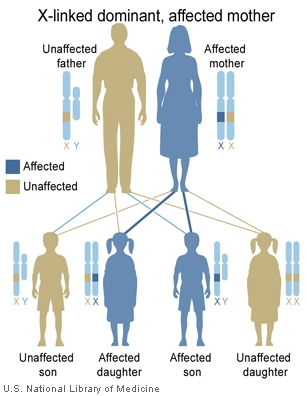File:X-Linked dominant (affected mother).jpg
X-Linked_dominant_(affected_mother).jpg (307 × 396 pixels, file size: 68 KB, MIME type: image/jpeg)
X-Linked dominant (affected mother)
In this example, a woman with an X-linked dominant condition has an affected daughter, an affected son, an unaffected daughter, and an unaffected son.
Examples of X-Linked dominant
- Inheritance Pattern images: Genetic Abnormalities | autosomal dominant | autosomal recessive | X-linked dominant (affected father) | X-Linked dominant (affected mother) | X-Linked recessive (affected father) | X-Linked recessive (carrier mother) | mitochondrial inheritance | Codominant inheritance | Genogram symbols | Genetics
Links: Spermatozoa | Oocyte
Reference
Image Source: Genetics Home Reference. http://ghr.nlm.nih.gov/handbook/illustrations/xlinkdominantmother
Copyright
Government information at NLM Web sites is in the public domain. Public domain information may be freely distributed and copied, but it is requested that in any subsequent use the National Library of Medicine (NLM) be given appropriate acknowledgement. http://www.nlm.nih.gov/copyright.html
Cite this page: Hill, M.A. (2024, April 19) Embryology X-Linked dominant (affected mother).jpg. Retrieved from https://embryology.med.unsw.edu.au/embryology/index.php/File:X-Linked_dominant_(affected_mother).jpg
- © Dr Mark Hill 2024, UNSW Embryology ISBN: 978 0 7334 2609 4 - UNSW CRICOS Provider Code No. 00098G
File history
Click on a date/time to view the file as it appeared at that time.
| Date/Time | Thumbnail | Dimensions | User | Comment | |
|---|---|---|---|---|---|
| current | 09:47, 12 May 2010 |  | 307 × 396 (68 KB) | S8600021 (talk | contribs) | ==X-Linked dominant (affected mother)== In this example, a woman with an X-linked dominant condition has an affected daughter, an affected son, an unaffected daughter, and an unaffected son. Source: Genetics Home Reference. http://ghr.nlm.nih.gov/handbo |
You cannot overwrite this file.
File usage
The following 15 pages use this file:
- 2010 BGD Practical 3 - Gametogenesis
- 2011 Lab 1 - Gametogenesis
- ANAT2341 Lab 1 - Gametogenesis
- ANAT2341 Lab 3 2013
- Abnormal Development - Genetic
- BGDA Practical 3 - Gametogenesis
- Fetal Cells in Maternal Blood
- Genome Sequencing
- M
- Molecular Development - Genetics
- Non-Invasive Prenatal Testing
- Preimplantation Genetic Diagnosis
- Prenatal Diagnosis
- X Chromosome
- X chromosome
